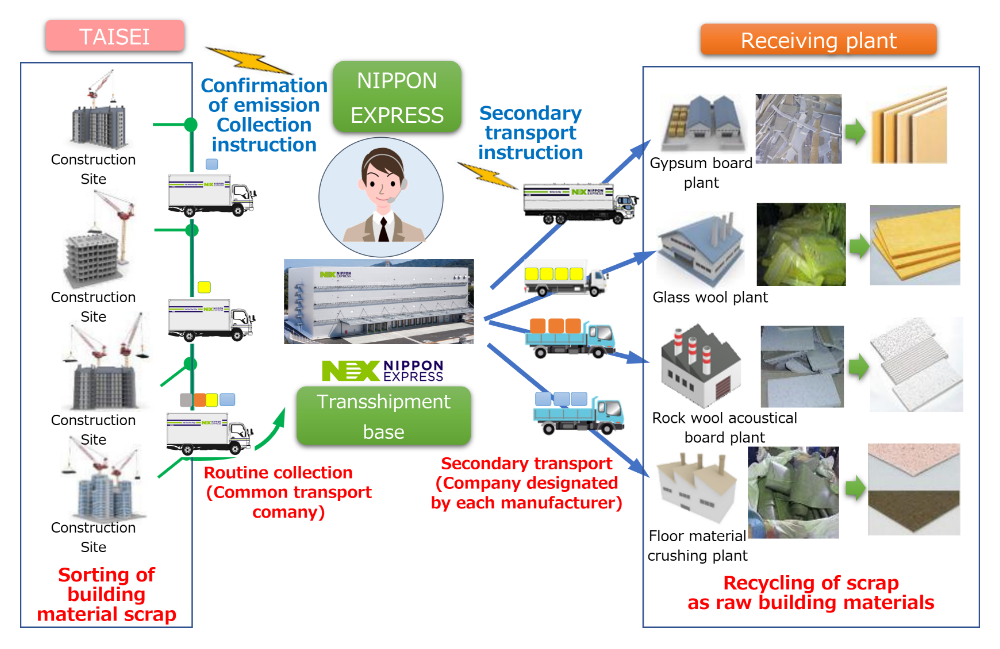Promotion of recycling building material resources by upgrading the routine collection system
[Company / organization] TAISEI CORPORATION NIPPON EXPRESS
Members, role of each member, and overview of cooperation
(1) Members and role of each member
- TAISEI CORPORATION: Sorting and managing quantity of noncombustible building material scrap
- NIPPON EXPRESS: Grasping the status of scrap at construction sites and the status of receiving plants, traveling construction sites and collecting scrap, and transporting it to transshipment bases.
- Transshipment base(NIPPON EXPRESS's Logistics Center): Sorting and collecting by manufacturer.
- Secondary transport company: Transshipping into vehicles designated by receiving plants, and transporting from transshipment bases to receiving plants(Some of them are also supported by NIPPON EXPRESS)
- Receiving plant: Recycling of scrap as raw building materials
(2) Overview of cooperation
By ensuring sorting and quantity control of scrap at the construction sites, integrated logistics management (collection, transshipment, and delivery management) based on 3PL (3rd Party Logistics) was made possible and efficient cooperative transportation between multiple construction sites and multiple receiving plants was realized.
Implementation period
Fiscal 2017 to now
Technology and business model
The National Permit System, which aims that building material manufacturers recycle scrap of their own products as raw materials, is an ideal system for recycling scrap of noncombustible building material which are difficult to recycle. However, when the system is used at construction sites, there is a problem of increased transportation costs caused by long-distance transportation of a small lot of scrap.
To solve this problem, we consolidated the collection of scrap and used our own integrated logistics system, and realized recycling by utilizing the National Permit System.
Our major efforts are as follows.
[1] Commonization of transport companies designated by manufacturers
By adding transport companies responsible for routine collection to the designated transport companies of each manufacturer and making them common transport companies, it became possible to collect building material scrap of different manufacturers with the same vehicle.
[2] Consolidation of individual arrangements by introducing NIPPON EXPRESS
This allowed the same vehicle to travel to multiple construction sites, efficiently collect scrap and unload them at multiple receiving plants.
[3] Matching of forward and reverse logistics
The return trips of vehicles that delivered building materials from plants were utilized as vehicles that transport scrap form transshipment bases.
This allowed us to promote resource recycling of noncombustible building material scrap.
This also led to reductions in landfill waste, disposal costs, and fuel consumption.
Achievement and goal
(1) Achievement
Construction materials: collected 1,694 tons (1,036 tons of waste for the National Permit System and 658 tons of valuables).
(As of September 2020)
(2) Goal
We will expand the number of participating sites and standardize cooperative routine collection to collect more building material resources.
Reference URL
http://www.cjc.or.jp/cjc_news/r02syshyo/r02_sys_hapyou.pdf#page=1
- Recycle
- End-of-use
- Construction
- Individual company
- Company in different category.
- Currently under implementation (already in business)


